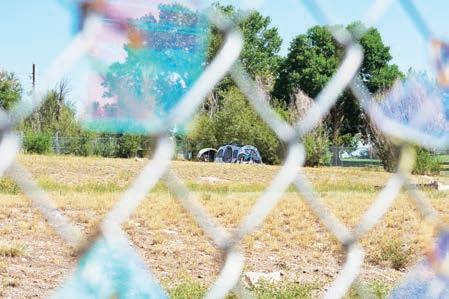
3 minute read
CAG Thrift Shop & Food Pantry
Golden Opportunity Scholarship
CAG operates exclusively for charitable and civic purposes for residents of Golden, Colorado. We provide food, financial assistance, and referrals to other community services to residents in crisis and/or experiencing hardship.
We value our community with integrity, empathy, teamwork, and volunteerism. We offer this Golden Opportunity Scholarship with the aspiration to continue these values. If you are a senior at Golden High School and share these values, and will be attending college in Colorado in the fields of medicine, education, social services, psychology, criminal justice, or nonprofit management, then this scholarship may be for you.
Under the new “Golden Opportunity Scholarships” program, CAG offers four scholarships of $5000 to Golden High School seniors each year. Requirement is that the students plan to further their education in the fields of medicine, education, social services, psychology, criminal justice, or nonprofit management.
Criteria:
• Plan on attending college in Colorado
• Plan on studying in the fields of medicine, education, social services, psychology, criminal justice, or nonprofit management
• Minimum 3.0 GPA
• Submit 3 Letters of Recommendation
• Personal essay: Please tell us about yourself and your future aspirations.
• Application due by March 31, 2023 mitigating their visual e ect on the community.
“ ere’s the needs of the unhoused folks in our community, and how we address that population and help them become housed. And, we have the impacts their homelessness situation has on our community, which we receive a lot of complaints about,” he said.
Later he elaborated on “cleaning up” homelessness even as the city has no shelters, “the perception that it degradates some of public spaces — makes them dirtier and more chaotic,” and that the city is allocating more sta and resources for “cleaning and maintenance on our right of way.” is includes working with CDOT and RTD, he said, “to encourage (the unhoused) to keep their facilities cleaner and really stay up with their obligations in our city.” e Severe Weather Shelter Network, the major emergency sheltering network for cold weather the county depends upon, also does background checks for violent o enses. Pastor Ben Hensley at the Lakewood United Methodist Church, the only participant in Lakewood’s CSPI pilot program, critiqued the Network for this requirement calling the background checks a barrier so high “it’s not really an e ective emergency response.”
Kraft- arp’s perspective was the county being a “facilitator and funder,” acknowledging the county has no shelters itself, but “many temporary beds,” of which almost all are volunteer and nonpro t run. Until Lakewood’s recent emergency weather shelter opening of the Whitlock Recreation Center, there were no city-run shelters of any caliber either.
Another variation of resolving homelessness across the panel consists of choosing who to help.
Evergreen Christian Outreach, or ECHO, has its own services and shelter beds. Program Director Tim Clancy elaborated in the discussion that ECHO does an interview to see if the people looking for shelter would be “successful” in the shelter, along with a criminal background check and sexual predator check.
Executive Director of Development at SWSN Lynn Ann Huizingh has told the Je co Transcript in the past that the background checks are meant to protect volunteers and guests from people with “violent o enses against other person in the last year.”

Je erson County homelessness stakeholders see una ordable housing as the main cause of homelessness in the county, such as for this encampment o the Colfax corridor. FILE PHOTO

“We do not want to enable, we want to empower,” Huizingh has said about their temperature cuto s, believing opening at any warmer temperatures would not “encourage people to pursue answers that would lead them o the street, and if they get too comfortable, they just don’t have any reason to try and pursue anything else.” e panel, including Lakewood Homeless Navigator Matt Wallington, Clancy, Barringer and Douglas, did agree that the dominant reason for homelessness is lack of a ordable housing, with Douglas touting the county’s 15-Year Housing Plan.
“What was really critical last year was when we started to look at some solutions. We really realized there was a need for more plans,” Douglas said. “It’s really meant to be a place where we pull together all the plans…and put it together in a document that can really help all our policy-leaders and community stakeholders look at a roadmap over the next 15 years.” e plan is still being developed with a panel of “community leaders,” though Douglas said that there were no people experiencing homelessness on that panel.
Ending with questions, Wallington responded to a question relating crime and mental health to homelessness by saying that only a third of those experiencing homelessness in Je co had any kind of mental illness, and any crimes committed were petty crimes like stealing clothes or food.
High police contact does not mean a higher crime rate either, he explained. ey are simply seen more. Barringer added that the “SafeLots” actually lowered crime in the area.









